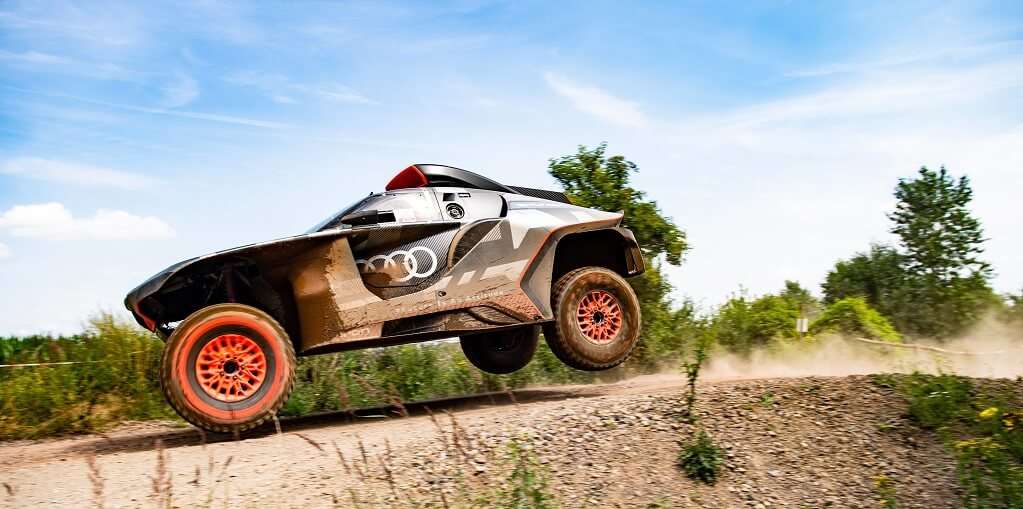Audi has already started testing the RS Q e-Tron
It has been a while since Audi Motorsport let out news of their plans of taking part in the upcoming Dakar rally with an electrified rally car (let’s say buggy!). They had also declared their team of drivers for the event, calling it the ‘Dream Team‘. Audi RS Q E Tron, the electric Dakar car from the four rings, has now broken covers. With the Dakar scheduled from 2nd to 14th January 2022, Audi has started testing the prototype.
Audi is the first manufacturer to race an electric prototype at the Dakar. The RS Q E Tron stands different from conventional Dakar prototypes in terms of design. It looks futuristic and has a decent focus on aerodynamics. The design pays tribute to the original Audi Quattro at multiple places. Key highlights include a steeply sloping roof, good looking windscreen, giant roof-mounted air intakes for cooling the motors, central fin-mounted LED units functioning as brake lights, 17-inch wheels with BF Goodrich tyres, and protrusions behind the doors which could look like the R8’s side fins but house two spare wheels.

Audi RS Q E Tron: Powertrain Details
The powertrain details of Audi RS Q E Tron prototype will blow your mind. Audi has leveraged maximum out of their motorsport pedigree to engineer this EV prototype. The car gets a total of three Motor Generator Units (MGU). These come directly from the Audi e Tron FE07 Formula E car, but have as per the manufacturer, been slightly tweaked for better fitting into the rally scene. Two of them are fitted on either of the axles. The third one is part of the energy converter unit, and remains structurally unchanged from those on the axles.
The energy converter is essentially an innovative charging concept that Audi has deployed on the RS Q E Tron prototype. Daily course at Dakar is around 800 kilometers long. The entire event spans two weeks, with the courses set mostly amidst deserts. Thus, the biggest challenge for an electric Dakar car would be the scarcity of charging infrastructure. The energy converter system takes care of this crisis. It gets the highly efficient 2.0L four-cylinder TFSI engine from the DTM as its heart. This mill is operated in its most efficient range of 4,500 and 6,000 rpm, which along with the third MGU, charges the battery even as you drive the car. You will be burning just under 200 grams of fuel per kWh. Energy is also recuperated during braking. The 50 kWh battery pack weighs just 370 kilograms, adding further to the overall efficiency.

The net power output of the RS Q e Tron’s drivetrain is 500 kW (671 hp) However, Audi is yet to confirm as to how much of this would be allowed in the Dakar Rally. The prototype can do the 0-100 kph sprint in 4.5 seconds and has a top speed of 170 kph. The car needs just one forward gear. The front and rear axles stand mechanically independent. Plus, these motors can be directly controlled by the car’s onboard computer. The software-based torque distribution, as per the manufacturer, would greatly improve the overall handling and dynamics. The absence of a mechanical differential and prop-shafts have also helped in keeping the overall weight in check.
Audi is commencing an intensive testing program for the RS Q E Tron prototype, in which it would be tested at multiple cross-country rallies until the end of the year. It would be a big milestone if Audi’s electric prototype actually completes the Dakar. Going by the brand’s history of being the first to claim a Le Mans 24 win with an electric powertrain, we do have reasons for hope!
Let’s get social! Follow Vroom Head India On Facebook, Instagram, Pinterest, Whatsapp and LinkedIn


